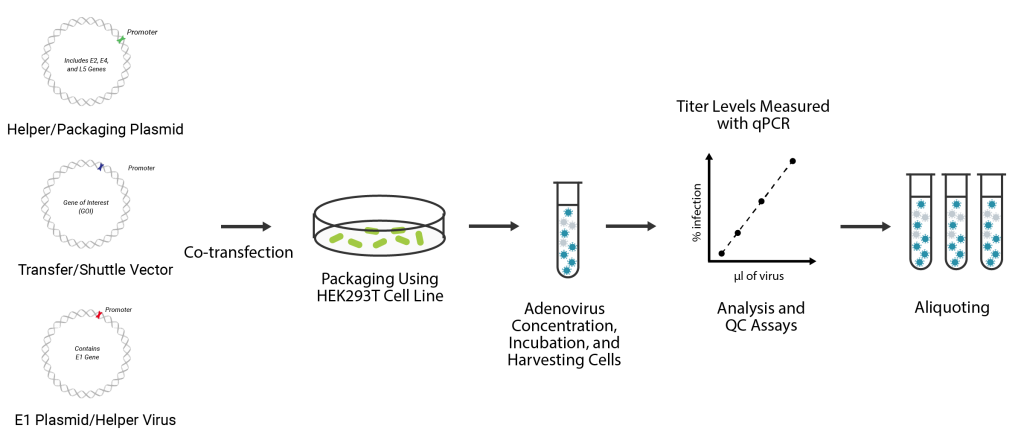Adenovirus Packaging For CRISPR Applications
BioInnovatise Viral Vector Team
Updated January 2026
Molecular Cloning & Mutagenesis Projects Completed
Viral Vector Packaging Solutions Delivered
Plasmid DNA Preparations Successfully Produced
Adenoviral vectors are a frequent viral vector choice for CRISPR delivery because of adenovirus’s high transduction efficiency and ability to infect dividing and non-dividing cells. Adenoviral CRISPR payloads are especially useful for in vitro genome editing research and development, transient knock-out studies, screening applications, and cell and gene therapy.
Our viral vector team has packaged many CRISPR payloads in adenoviral vectors and have prepared the below resources for researchers.
Adenovirus Packaging for CRISPR Transgenes
Adenovirus packaging varies depending on the protocol used which vary depending on virus type, insert size, transfection method, etc. However they generally follow a similar structure from transfection to purification.
The overall adenovirus packaging for CRISPR applications workflow includes:
- Transfection: Introducing the adenoviral backbone containing CRISPR components into packaging cells
- Amplification: Serial passage to increase viral titer
- Purification: CsCl gradient centrifugation or commercial purification kits
- Titration: Determining infectious units and particle concentration
Our viral vector team always follows the prescribed protocol a researcher provides when starting an adenovirus packaging production.

The above diagram illustrates the general adenovirus packaging process at BioInnovatise, where our team uses a HEK293T cell line for adenovirus packaging.
Why Is Adenovirus Better For CRISPR Payload Delivery?
Researchers choose between different viral vectors for their application based on a variety of factors. For CRISPR based research applications, many researchers prefer adenoviral vectors for a few reasons.
- Advantages Over AAV:
- Adenovirus has a higher payload capacity than the AAV vector (~4.7 kb) and can package about 10 kilobases for second-generation vectors. AAV CRISPR payloads require dual vector approaches.
- Advantages Over Lentivirus:
- Adenovirus remains episomal and does not integrate into the host genome. This eliminates the risk of insertional mutagenesis – particularly important for CRISPR applications where you want precise, temporary editing without permanent vector integration.
Adenoviral vectors are not perfect however. Adenovirus can trigger strong immune responses, adenoviral vectors have transient expression, and certain tissue types are naturally resistant to adenoviral infection.
When does Adenovirus Excel in CRISPR Applications?
- Single-Treatment Protocols:
- When you need high, immediate CRISPR expression for one-time editing events rather than sustained expression.
- Safety-First Applications:
- Where avoiding genomic integration is paramount, such as in clinical applications or when working with primary cells.
- Research Screening:
- For high-throughput knockout screens where you need rapid, uniform transduction across many cell types.
- In Vivo Applications:
- When you want transient editing without long-term vector persistence in the organism.
Notes from our lab: Ad5 (Adenovirus Serotype 5) remains the most commonly adenovirus serotype used for adenoviral CRISPR and non-CRISPR transgene payloads due to it’s high transduction efficient.
Learn about our quick turnaround adenovirus packaging service.
Want to learn more about the latest in adenoviral based research? Our colleagues at ScienceDirect and Genetic Engineering & Biotechnology News are always collecting and publishing the latest information on adenovirus based research.

Trusted By Top Researchers Across Disciplines and Therapeutic Areas

Subscribe for Product Releases, New Resources, and Company Updates
13 Taft Court Suite 220
Rockville, MD 20850
(301) 838-8675
Follow Us on LinkedIn
© 2026 BioInnovatise, All Rights Reserved

